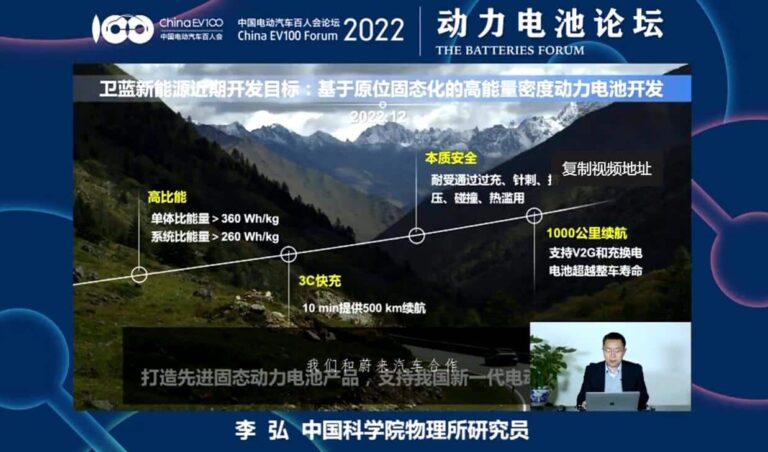WeLion was out of favor with investors just over a year ago, but with Nio Day 2020 putting solid-state batteries in the spotlight, the company's funding environment has turned around.
(Image credit: WeLion)
A little more than a year ago, Beijing WeLion New Energy Technology was not a favorite among venture capitalists. But with the announcement of Nio's 150-kWh pack, which puts solid-state batteries in the spotlight, the solid-state battery maker's fortunes appear to be starting to turn around.
WeLion's latest valuation has reached 15 billion yuan ($2.36 billion), PE Daily, a media outlet that follows China's investment and financing activities, said in a report today, citing an unnamed person from a PE firm.
The person, who has invested in battery maker CALB, which has filed to list in Hong Kong, got the valuation information from a peer, the report noted.
Nio said at the launch of its flagship sedan, the Nio ET7, at the Nio Day 2020 event on January 9, 2021, that the model will be available in a version with a 150-kWh solid-state battery starting in the fourth quarter of 2022, giving it an NEDC range of 1,000 kilometers.
Nio (NYSE: NIO, HKG: 9866) has never announced the supplier of the battery, and rumors about who that supplier is have surfaced from time to time.
At the China EV 100 forum on March 27, WeLion's chief scientist and founder Li Hong confirmed that the company is Nio's semi-solid-state battery supplier.
WeLion is working with Nio on plans to launch a hybrid solid-liquid electrolyte battery with a range of 1,000 kilometers on a single charge, based on the ET7 model, Li said.
The pack, which has a capacity of 150 kWh and an energy density of 360 Wh/kg, is expected to start mass production by the end of this year or the first half of next year, Li said.
Founded in 2016, WeLion closed two funding rounds each in 2017 and 2018.
Several well-known venture capital firms approached WeLion around 2018, yet most did not decide to invest in it. In the following two years, WeLion did not announce any new funding for a long time, PE Daily's report noted.
The turning point for WeLion came in 2021, when several venture capital, as well as private equity firms, began to increase their engagement with WeLion after Nio's launch brought the battery industry into the spotlight, according to the report.
In February 2021, several new companies were added to WeLion's shareholder list, which was then valued at over RMB 2 billion, according to PE Daily.
In July 2021, several more companies were added to WeLion's shareholder list, one of which is effectively controlled by Nio Capital, the venture capital arm of Nio, and another by the well-known IDG Capital, the report said.
In late November last year, tech media outlet 36kr cited sources familiar with the matter as saying that Nio's supplier of 150-kWh semi-solid-state batteries was WeLion, and that the battery maker would receive an investment of about RMB 500 million from Xiaomi and Huawei.
The investment puts WeLion's valuation at RMB 5 billion, the report said, adding that Huawei, Xiaomi and Shunwei Capital had signed off on the investment in August 2021.
CnEVPost mentioned yesterday that there was another change in WeLion's shareholder list on March 24, when affiliates of Xiaomi and Huawei became new investors.

